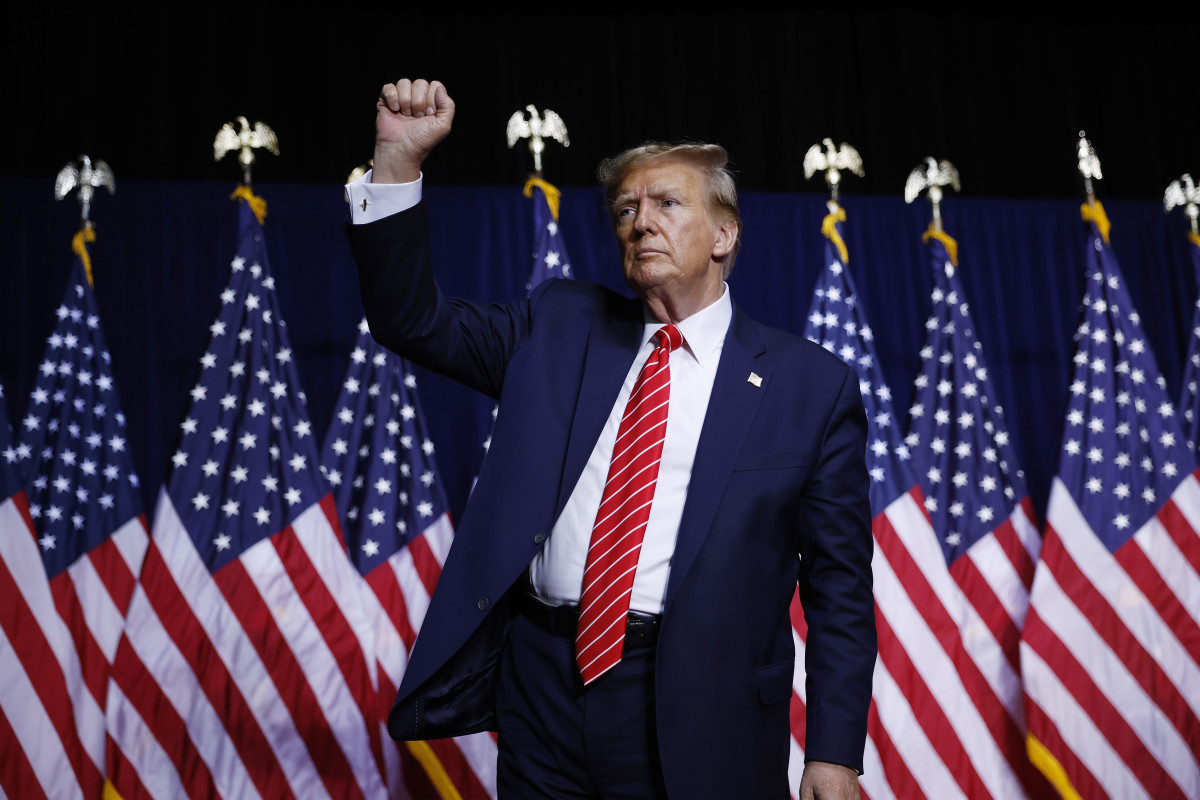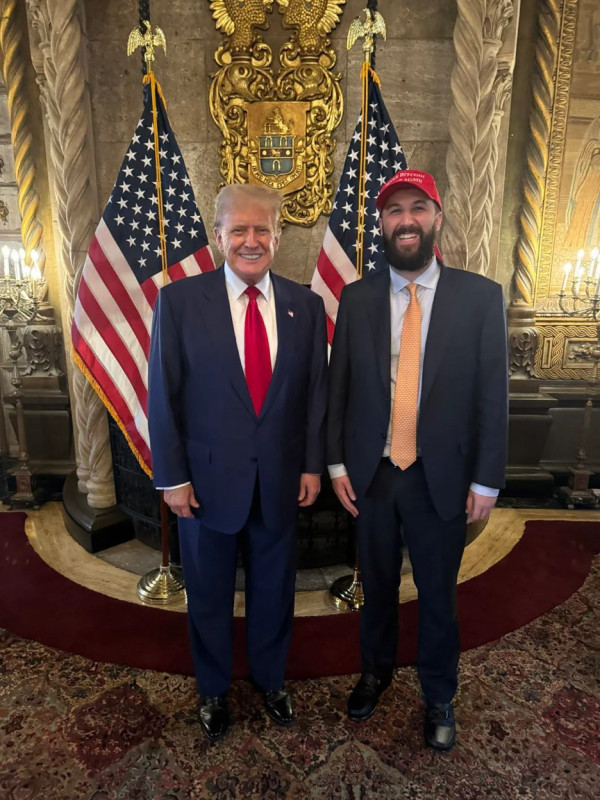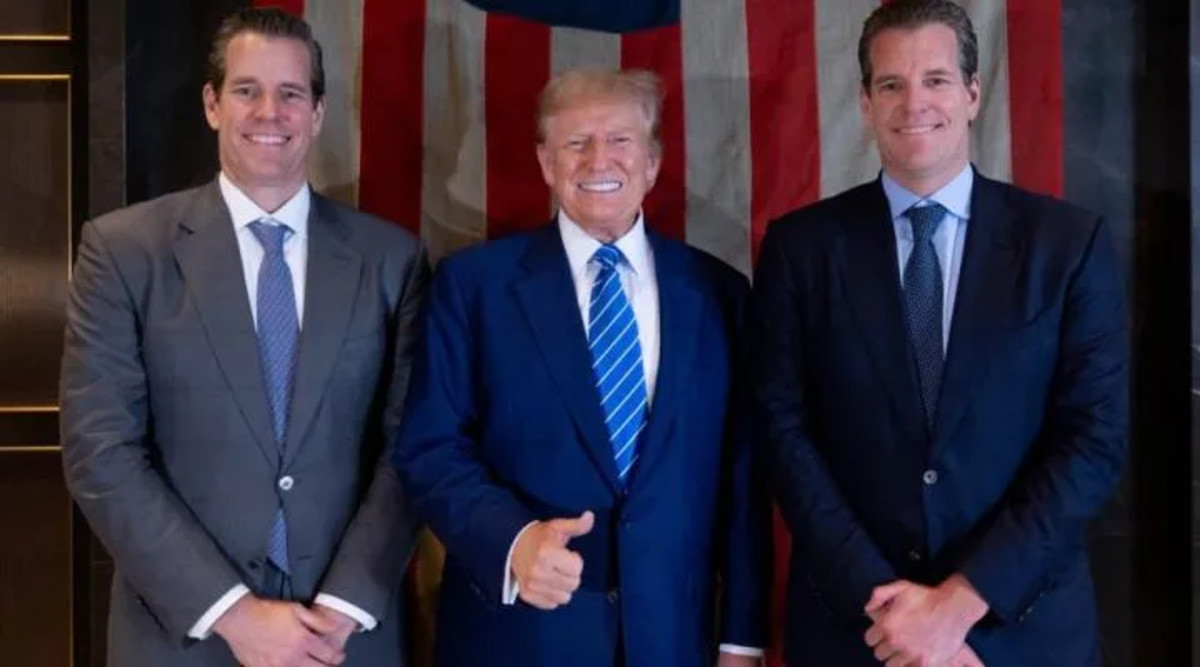Culture
Trump Is The Best Choice For Bitcoin
Published
4 weeks agoon
By
admin

One in four Americans own Bitcoin.
That’s more Americans than are over the age of 65, but how often do you hear candidates talk about senior concerns compared to concerns of crypto owners?
President Donald Trump has been making a concerted effort in the 2024 campaign trail to appeal to Bitcoiners.
At the recent Libertarian National Convention, President Trump vowed to “stop Joe Biden’s crusade to crush crypto,” and assured Bitcoin holders specifically that he supports the right to self-custody.
“I say this with your vote, I will keep Elizabeth Warren and her goons away from your Bitcoin, and I will never allow the creation of a central bank digital currency,” President Trump said.
It’s clear which candidate this November is the best choice for Bitcoin owners and the entire industry – President Trump. He appears to see the wisdom of the pro-Bitcoin stances taken by popular leaders around the world, such as Presidents Javier Milei of Argentina and Nayib Bukele of El Salvador
Accordingly, he is staking out a clear position.
Trump acknowledges our right to self-sovereignty, and perhaps no one better understands the value of decentralization, as people have been losing trust in institutions like the government and banks. Trump has been the target of unprecedented lawfare politicizing the justice system, and Trump-affiliated organizations have been debanked and de-platformed.
President Biden, meanwhile, just vetoed legislation that would have ensured a customer’s right to have their preferred regulated financial institution custody their Bitcoin or other digital assets—laughably—in the name of “consumer protection.”
The Biden administration has been extraordinarily hostile to Bitcoin as well as the broader cryptocurrency ecosystem. The administration launched “Operation Choke Point 2.0” whereby regulators effectively instituted new rules via press release instructing banks to stop doing business with companies in the digital asset space. Further, the White House proposed a 30 percent tax on the energy used to mine Bitcoin, which would make it unprofitable and completely uneconomical for the industry to do business in the United States. Their Energy Department also attempted to collect information regarding Bitcoin miners’ energy contracts as a step towards regulating them out of business. The Justice Department even broke with long-standing Treasury Department guidance when it attempted to regulate via court filing to say that self-hosted wallets should be treated as money transmitting businesses. This is all by design. They want to effectively ban the industry.
It all starts to make sense when you consider that the Biden administration has also laid the groundwork for a Central Bank Digital Currency.
Certain politicians support the creation of a CBDC because they desire complete control. They want to be able to track our transactions and tell us how we can and cannot spend our money. Bitcoin represents the polar opposite: freedom from government-driven collectivism and the empowerment of the individual.
To be clear, there are many pro-Bitcoin leaders in the Democratic party, such as Sen. Kirsten Gillibrand and Reps. Ritchie Torres and Wiley Nickel, just to name a few. Over 70 Democrats in the House of Representatives recently voted for favorable market structure legislation. But there needs to be many more.
President Biden has surrendered governance of his administration on these issues to the self-appointed “anti-crypto” Senator Elizabeth Warren and her acolytes. This has resulted in policies that mirror the Chinese Communist Party’s approach to Bitcoin, and anything of which the ruling party disapproves: cut off financial services, attempt to cut off access to energy in the name of environmentalism, impose impossible market regulations, and essentially do anything they can to handicap the Bitcoin network while they work towards the ultimate tool of control over their populace: a CBDC.
Sen. Warren herself has even proposed legislation that would effectively ban Bitcoin mining in the United States by treating miners the same as financial institutions by requiring anti-money laundering standards despite the fact that miners do not custody any customer assets. As she well knows, if there are no Bitcoin miners, there are no Bitcoin transactions, and the path to a CBDC would be much easier without any private alternatives.
The good news for Bitcoiners this November is that they have a clear alternative. This is critical because a whopping one-third of voters say they are weighing candidates’ views on digital assets for their choice in the election.
The choice is clear. President Trump will protect your right to own Bitcoin, to mine Bitcoin, to transact with Bitcoin, and for many of us, to work in the Bitcoin industry. We believe he will support Bitcoin miners’ ability to help revolutionize the finance and energy industries in the United States and maintain American economic leadership for the future. And he will ban a CBDC, protect self-custody, and stop out of control regulators from trying to put us out of business. If you are a Bitcoiner, President Trump is the best candidate this year to, dare I say, Make Bitcoin Great Again in the eyes of the U.S. government.
Brian Morgenstern is the head of public policy for Riot Platforms. He previously served as deputy assistant secretary of the Treasury and White House deputy press secretary.
This is a guest post by Brian Morgenstern. Opinions expressed are entirely their own and do not necessarily reflect those of BTC Inc or Bitcoin Magazine.
Source link
You may like


What’s the best new crypto in 2024?


Bitcoin Mining Difficulty Crashes 5% To Lowest Level In 3 Months, What Happens Next?


Bitcoin (BTC) Price, Volume Contrasts In Fight For Rebound


The German Government Is Selling More Bitcoin – $28 Million Moves to Exchanges


BC.GAME Announces the Partnership with Leicester City and New $BC Token!


Justin Sun Says TRON Team Designing New Gas-Free Stablecoin Transfer Solution


Today is America’s Independence Day, a celebration of our freedom from the British Empire and the tyranny of a bureaucracy removed by thousands of miles of ocean ruling over our lives. The Revolutionary War that won us that freedom is not something that happened overnight, or something that just sparked due to one event or circumstance in the short term, it was the result of over a century of an overbearing government influence on the colonists that resided in North America.
In the same way, Bitcoin was not a thing born out of the singular event of the Great Financial Crisis. Just like colonists for over a century dealing with increasing taxes, overbearing regulations, and general exploitation birthed the United States, decades of parasitic economic and financial actions birthed Bitcoin.
While America and the struggles that led to its creation were rooted in a bureaucracy disconnected by physical distance, Bitcoin was born from troubles rooted in a more existential disconnection rather than one of physical space. In the same way the King and his advisors in England had a disconnected and impersonal view of the human beings on the other side of the Atlantic, today’s bureaucrats have a disconnected and mechanical view of the human beings they rule over despite the lack of physical distance.
Politicians, regulators, bureaucrats, financial executives, none of them see the people they rule over, or make decisions drastically altering the course of their lives or circumstances, as actual people. They see numbers, they see statistics, they see stereotypes and generalizations. They see impersonal figures and patterns that someone seems to fit at a glance, and decide based on that.
They have no empathy, they have no understanding of an individual’s personal circumstances, or situation in life, or the problems they deal with because of automaton like decision making in the halls of Congress, or the SEC building, or a bank.
So why do we look to these people for approval, or a road to success, or some glimmer of hope that they will achieve that understanding? Imagine if a decade after achieving its independence America had turned back to England for help in achieving its success. Does that seem rational to you? Does that seem like a fruitful road to achieving success and prosperity?
The answer should be a resounding no. They don’t care about you, or me, or any of us.
So why do so many Bitcoiners look to these parasites and narcissists for salvation? It is an indication of completely losing the plot, the purpose of what Bitcoin was made for. In a way it is very similar to the current state of America as a nation, lost and disconnected from the purpose and ideals it was initially founded on. Liberty, self determination, justice.
These people are not here to help us, they are not here to turn Bitcoin into a beacon of individual liberty and freedom. They are here to exploit, to subvert, to maintain the position they hold in the world where they can remain callously disconnected from the rest of us in a position of security and luxury for themselves.
America was founded specifically because of the realization that England would not give them self determination or liberty. The founding fathers realized that, and so they set out to achieve it on their own terms, by building something new, something innovative that the world had never seen before.
Bitcoin is no different, but rather than holding fast to those principles and ideals, Bitcoiners seem content to go running back to England for permission to self determination. Asking permission to achieve their liberty.
This is a mistake. Bitcoin was created to be that new, independent, innovative thing the world has never seen before. It was built to stand on its own as a foundation of sovereignty, and self determination. Not something that we beg for permission to have, to build upon, to use.
We need to hold to that, not go begging politicians and regulators for an easy road to “success,” that in reality is simply a failure wrapped in a blanket of cope. Bitcoin is here, it was put here without asking for permission, without begging the King to allow it to be, and here it will stay.
Whether it succeeds or fails doesn’t come down to politicians, or regulators, or Wall Street money, it comes down to us.
Happy Fourth of July to those who still seek self determination instead of permission.
Source link
Culture
Palestinian Taxi Driver Uses Bitcoin To Save Civilians In Gaza
Published
2 weeks agoon
June 26, 2024By
admin
Countless lives were changed on October 7th, 2023, and Yusef Mahmoud’s was no different. Even before the war, the Palestinian taxi driver couldn’t stand being a passive observer of unemployment and hunger, both prevalent in Gaza’s everyday life. In 2022 and early 2023, more than two million Gazans lacked access to clean water and an appropriate sewage system, while two-thirds of the population lived in poverty.
Against this backdrop, Yusef turned online for help. It was Ramadan of 2023 and he wondered if other Muslims across the globe would contribute with bitcoin, the first decentralized cryptocurrency, that he could use to buy and distribute food for those in need and toys for children in Gaza. UK-based Bitcoiner Fumble was amongst those who answered his call.
“I quickly saw that Yusef was genuinely transferring over the support he received to people on the ground,” Fumble recalls. “As Bitcoiners sent satoshis (bitcoin’s smaller monetary units) to Yusef, he returned pictures of the donations’ impact on elderly people and orphans around him. The more proof I saw of his work, the more I wanted to help, and that’s when I suggested Geyser as a means for Yusef to organize his initiative and scale up the project.”
In April 2023, Yusef launched a project on Geyser, a global Bitcoin crowdfunding platform, to raise more funds and provide food and potable water to Palestinian civilians in need.

When the going got tougher, support followed
Within the following months, Yusef’s project took on new dimensions. The situation in Gaza was aggravated due to the military occupation, which displaced 85% of Gaza’s population and halted economic activities, further worsening poverty and unemployment. Demand for food and water escalated and Yusef switched focus from supporting families during Ramadan to providing everyday essentials for civilians in need.
Between April 2023 and May 2024, more than 1,500 people had donated to the cause. This has enabled Yusef to repeatedly buy food and potable water for 20,000 families in Gaza, each with an average of five to seven members. About 500 of the people he helps are orphans.
Fumble explains that having a Geyser project made it easier for people to support Yusef’s efforts. Today, Yusef relies on these donations to continually source tinned food, baby supplies, potable water, bags of flour, clothing, and access to medication for civilians. Donations have also been ensuring that Yusef has enough credit on his e-SIM card to stay connected and up-to-date on what the community needs, and so he can access the donations received through the project.

“More people over here are now using Bitcoin, there’s no other way.”
Within two months of the start of the war, unemployment in Gaza had surged to 79.3%. Locals lack sources of income and access to water, sanitation, healthcare, and education. Half of the local population are children. Meanwhile, even those who had savings in the bank found themselves unable to make transactions.
“During wars, you’re left with only the change you had in your wallet,” Yusef explains over a glitchy call, where Fumble is also present to help bridge our language gap. “Bank apps in our phones are down and banks are freezing accounts in Gaza. We only have cash or Bitcoin.”
Fumble explains that the Palestinian economy runs on the Israeli shekel and that Gaza’s financial system is almost completely dependent on Israel, which must approve the movement of cash into the area.”The occupation is why payment processors don’t facilitate it, and it is the reason why Israel has control over transactions that come to their banks,” says Fumble.
Because of this, many Palestinians relied on contacts from abroad to manage or access their funds, but tales abound of people who trusted someone to receive their money only to find that the person wouldn’t pass it over to its rightful owner. Those who do pass on the money often charge a steep fee upwards of 30%.
For people like Yusef, Bitcoin emerged stronger than ever as an alternative. Its peer-to-peer, permissionless nature enables him to bypass financial and platform barriers to get aid from abroad and help people on the ground. Additionally, fees to exchange bitcoin into fiat money are around 5%, making it cheaper and faster than the alternative. “You can see why more people over here are now using Bitcoin; there’s no other way,” Yusef shares.
Additionally, other crowdfunding platforms either don’t operate in Gaza or have blacklisted it, so you can’t use them to send or receive funds if you’re registered in Palestine. Geyser continues to enable people in this location to raise funds using bitcoin, with added precautions such as requiring users to ID themselves to ensure funds are not being used to support sanctioned individuals.

“Citizens have no fault in this war, that’s why I help them.”
To further complicate the economic situation in Gaza, many families are separated by enforced displacement as Palestinian men are detained at scale while their families are told to flee. “Fathers were the key breadwinners in Gaza, and many families are now left to fend for themselves. These are the people most often coming to my door asking for help,” says Yusef.
To help them, Yusef regularly drives to Rafah in search of supplies. The commute isn’t easy. Dislocation across Gaza makes Yusef more vulnerable to being targeted while thorough inspections by military forces restrict the goods coming into Rafah from Egypt. “Supplies are being deliberately restricted,” explains Fumble. “There’s no anesthetic, no insulin, medical respirators are punctured… Even a pair of medical scissors may be considered a weapon and used as an excuse to reject a batch of supplies. Not to mention trucks are deliberately being delayed so the food goes bad.” When asked about what motivates him to carry on, Yusef replies simply: “Citizens have no fault in this war, that’s why I help them.”
But there are also good days. In March 2024, Yusef managed to buy 2,700 chickens from Egypt to feed his community. The order qualified as ‘commercial capacity’, which simplified the bureaucracy across borders. These large-scale transactions are a source of hope for Yusef, but they’re only possible when substantial donations come in.
In April 2024, Yusef’s project received $48k worth of bitcoin. I ask Yusef whether he is proud or surprised by this achievement, to which he says: “My greatest achievement has been getting people, especially children, the help they need.” More recently, he built almost 100 tents to shelter displaced families.
Although his project consistently ranks amongst the most funded on Geyser, it sometimes struggles to keep up with the relentless needs and expenses Yusef has been trying to meet. For example, not only is food hard to come by but it also comes at a huge price inflation when available. On the week of our call, soon after Yusef raised $48k on Geyser, donations became scarce and he came close to selling his car so he’d have money to help people in desperate need of medical aid. “To help more people, we need the money to access large-scale supplies and rent cars or trucks to transport those goods to displaced communities,” he explains.

Using bitcoin to meet people’s immediate needs, one day at a time
Online, the work is carried out on X, where Fumble helps Yusef spread the word about the project so the trickle of donations doesn’t dry out. “Yusef sends me videos of the work being carried out on the ground, which helps to prove that the project is credible and genuine. The consistency with which he shares those videos helps to demonstrate transparency about his intentions. The challenge is sharing as much information as possible without compromising people’s safety,” Fumble explains.
“You have to be very mindful,” says Fumble. “We want to show as much as possible what’s happening and Yusef’s first-hand content is precious in that regard. The more transparency, the more likely people are to donate. But at the same time, we need to protect innocent civilians in Gaza, many of whom feel quite abandoned by the world.”
Alongside that sentiment, Palestinians stick to the long held mantra “steadfast.” When asked whether he has hopes that life will return to normal, Yusef doesn’t hesitate: “Yes, of course.”
Until then, Fumble thinks about how else he can help civilians in Gaza. On the cards is the possibility of manufacturing and supplying 3D-printed prosthetics for children who’ve lost limbs during this conflict. “When I share these ideas with Yusef, he just says ‘God willing’,” says Fumble, “because he doesn’t take anything for granted; he’s working hard to meet people’s immediate needs. The bitcoin donations have become that lifeline he’s holding on to get people through just one more day.”
Donate to Yusef’s Save Gaza project here.

This is a guest post by Michele Morucci. Opinions expressed are entirely their own and do not necessarily reflect those of BTC Inc or Bitcoin Magazine.
Source link
Culture
Bitcoin's Trump Card: Dividing Is The Wrong Move
Published
2 weeks agoon
June 26, 2024By
admin

Ever since Donald Trump became more vocal in support of Bitcoin heading into this year’s Presidential campaign, I’ve been sitting with a wide range of emotions and concerns.
Outside of Bitcoin, as a left-leaning voter and vocal critic of Donald Trump, I have deep concerns with such an ego-centric, narcissistic character assuming power in the oval office again, not to mention the damage this could do to issues I deeply care about in the U.S. including a woman’s right to choose, reproductive rights, immigration, global affairs, and beyond.
I came into Bitcoin and began writing, running the Progressive Bitcoiner, and advocating for Bitcoin to those outside of the right leaning/libertarian bubble because I had great concerns about Bitcoin being perceived as “right wing” or politically polarizing. It’s open source code, digital peer-to-peer cash, not belonging to any one ideology or political party. I believe in its importance to radically improve our world, and the lives of millions and billions of people. Already from the left, campaigns like Greenpeace USA, Elizabeth Warren’s anti-crypto army, and beyond assume Bitcoin to be a haven for criminals and terrorists, climate denying fossil fuel tycoons, and only for the wealthy and wall street. Despite advances in data showing Bitcoin is one of the most, if not the most, sustainable industries on the planet, it’s growing list of human rights use-cases and more, appealing to progressives and the left about Bitcoin (yes Bitcoin specifically, not crypto) continues to be an uphill battle. What should we expect after years of Bitcoin’s loudest voices promoting various right leaning ideologies, encouraging books like the Bitcoin Standard, various right wing lifestyle maximalism tropes including carnivore diets, traditional family values, skepticism of science and climate science, and beyond.

The Trump campaign, and Bitcoiners openly donating to, engaging with, and stanning for Trump makes my job a lot harder. Metaphorically, we went from going fishing (regarding steady bitcoin adoption) to throwing a grenade in the water, without the slightest pause for how this may affect the bigger picture.
The reality is, post 2016 with the election of Donald Trump, and the doubling down of Hillary and the Democratic party calling his supports a “basket of deplorables,” (yes I’m quite critical of the left too!) our political polarization has skyrocketed, leaving most to feel politically homeless (some studies suggesting between 70 million to 100 million Americans).
The left has been corrupted by purity culture. If your view, means to an end, etc. has not been approved by The Left Regime (or you are not well versed on dozens of leftist philosophers and the latest theories), you’re out! Trump and bitcoiners aside, this is also why it’s so hard to get them to engage on bitcoin, because it’s not what their tribe uses, it’s right wing money (according to them).
The right has been overtaken by Trump and a party of valueless debauchery. Conservatives/republicans used to be values driven with actually policy and ideas, which I could agree or disagree with. Now it’s just complete chaos fueled and led by Trump, who has no political philosophy or value system, just ego.
Bitcoin should be a tool to cut through this noise. A tool that any ideology in this case can find useful and valuable. Instead, I’m deeply concerned the narrative may very well latch on to Trump-ism for the next several years, and beyond. Am I ultimately concerned about Bitcoin, its code, usefulness, use-cases, and beyond? Not for this Trump/political reason, no not necessarily (I do have concerns about regulatory capture via ETF’s, mining centralization, lack of privacy and better tools for bitcoin’s peer-to-peer use, etc…but that’s a chat for another time).
I just simply think it’s a bad move for bitcoiners to put all their eggs in the Trump basket, or any political basket for that matter. There’s severe reputational risk, slow down of adoption in the U.S. for those (especially on the left) that will see this as “Trump’s thing” or “right wing” and further this narrative, and the politicians who will respond by doubling down on narratives they continue to try to push against Bitcoin.

For Bitcoin’s social layer, I think it’s in the best interest to continue educating on bitcoin, advocating for grassroots adoption at the individual/community level, holding politicians accountable when they try to overstep (like Elizabeth Warren wanting to institute a backdoor ban on self-custody…no, we’re not going to let that fly, much less how that’s blatantly unconstitutional), and not desperately clinging to politicians’ words on the campaign trail, no matter who they are, that are purely pandering for votes, regardless of what may happen once they are in office (or what they can actually do, versus the legislative and judiciary branches).
As for me, an independent voter, I care deeply about Bitcoin, it’s long-term success, and seeing as many people as possible around the world use and benefit from this revolutionary money and technology. Both for Bitcoin, and for reasons beyond Bitcoin and into my values I stated above, I cannot in good conscience support Donald Trump. You don’t have to vote for Donald Trump to support, learn about or use Bitcoin, or contribute to the Bitcoin ecosystem.

Whether you agree or disagree with me, my hope is that among a growing chorus of Trump supporters from the Bitcoin community, those on the outside looking in may see that not all of us are on the same page, and that Bitcoin is for anyone regardless of your political party or who you plan to vote for come November.
This is a guest post by Trey Walsh. Opinions expressed are entirely their own and do not necessarily reflect those of BTC Inc or Bitcoin Magazine.
Source link

What’s the best new crypto in 2024?

Bitcoin Mining Difficulty Crashes 5% To Lowest Level In 3 Months, What Happens Next?
Bitcoin (BTC) Price, Volume Contrasts In Fight For Rebound

The German Government Is Selling More Bitcoin – $28 Million Moves to Exchanges
BC.GAME Announces the Partnership with Leicester City and New $BC Token!

Justin Sun Says TRON Team Designing New Gas-Free Stablecoin Transfer Solution

Mt. Gox is a ‘thorn in Bitcoin’s side,’ analyst says

XRP Eyes Recovery Amid Massive Accumulation, What’s Next?

Germany Moves Another $28 Million in Bitcoin to Bitstamp, Coinbase

'Asia's MicroStrategy' Metaplanet Buys Another ¥400 Million Worth of Bitcoin

BlackRock’s BUIDL adds over $5m in a week despite market turbulence

Binance To Delist All Spot Pairs Of These Major Crypto

German Government Sill Holds 39,826 BTC, Blockchain Data Show

HIVE Digital stock rallies over 9% as Bitcoin miner bolsters crypto reserves to 2.5k BTC

Pepe Price Analysis Reveals Bullish Strength As Bitcoin Plummets

Bitcoin Dropped Below 2017 All-Time-High but Could Sellers be Getting Exhausted? – Blockchain News, Opinion, TV and Jobs

What does the Coinbase Premium Gap Tell us about Investor Activity? – Blockchain News, Opinion, TV and Jobs
BNM DAO Token Airdrop
A String of 200 ‘Sleeping Bitcoins’ From 2010 Worth $4.27 Million Moved on Friday

NFT Sector Keeps Developing – Number of Unique Ethereum NFT Traders Surged 276% in 2022 – Blockchain News, Opinion, TV and Jobs
New Minting Services

Block News Media Live Stream

SEC’s Chairman Gensler Takes Aggressive Stance on Tokens – Blockchain News, Opinion, TV and Jobs

Friends or Enemies? – Blockchain News, Opinion, TV and Jobs

Enjoy frictionless crypto purchases with Apple Pay and Google Pay | by Jim | @blockchain | Jun, 2022

How Web3 can prevent Hollywood strikes

Block News Media Live Stream

Block News Media Live Stream

Block News Media Live Stream

XRP Explodes With 1,300% Surge In Trading Volume As crypto Exchanges Jump On Board
Trending

 Altcoins2 years ago
Altcoins2 years agoBitcoin Dropped Below 2017 All-Time-High but Could Sellers be Getting Exhausted? – Blockchain News, Opinion, TV and Jobs

 Binance2 years ago
Binance2 years agoWhat does the Coinbase Premium Gap Tell us about Investor Activity? – Blockchain News, Opinion, TV and Jobs
- Uncategorized3 years ago
BNM DAO Token Airdrop

 Bitcoin miners2 years ago
Bitcoin miners2 years agoA String of 200 ‘Sleeping Bitcoins’ From 2010 Worth $4.27 Million Moved on Friday

 BTC1 year ago
BTC1 year agoNFT Sector Keeps Developing – Number of Unique Ethereum NFT Traders Surged 276% in 2022 – Blockchain News, Opinion, TV and Jobs
- Uncategorized3 years ago
New Minting Services

 Video2 years ago
Video2 years agoBlock News Media Live Stream

 Bitcoin1 year ago
Bitcoin1 year agoSEC’s Chairman Gensler Takes Aggressive Stance on Tokens – Blockchain News, Opinion, TV and Jobs

